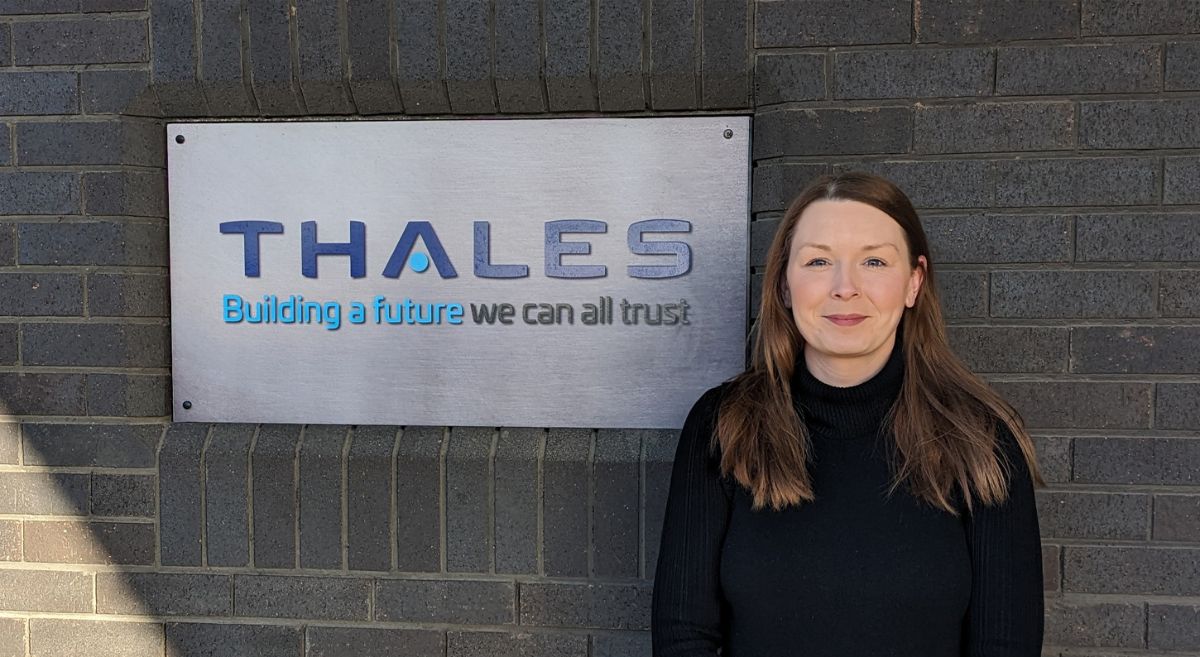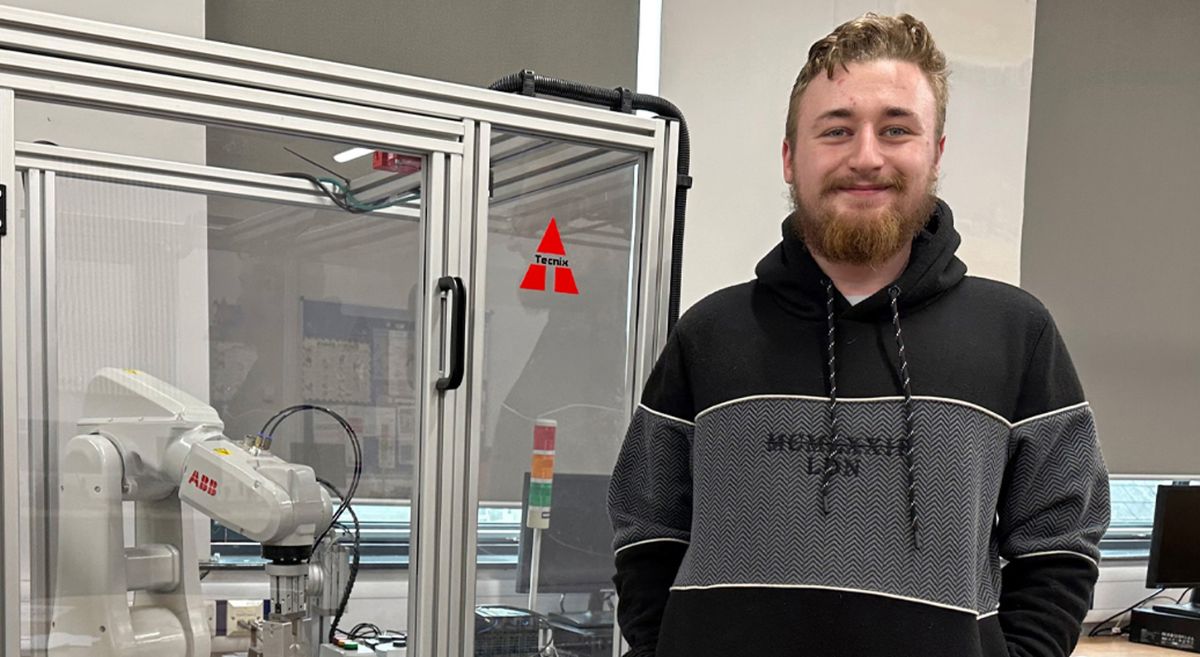Higher Level Apprenticeship in Mechatronics
As part of this Higher Level Apprenticeship, you will complete a Foundation Degree in Mechatronic Engineering (validated by Ulster University).
Available Sessions
We have 2 sessions available for application on this course in Lisburn, Bangor.
Studying mechatronics at Level 5 offers a broad and versatile foundation in engineering principles, making it an excellent choice if you are looking to enter the engineering field or advance their careers.
This program provides a comprehensive understanding of various engineering disciplines, with a slant towards manufacturing automation.
It will equip you with practical skills and theoretical knowledge that are highly valued by employers, enhancing employability and opening up diverse career opportunities.
Additionally, it serves as a stepping stone for further education, such as progressing to a Level 6 Bachelor’s Degree in Engineering.
Mechatronic engineering unites the principles of mechanics, electronics and computing. It combines mechanical engineering problem-solving and design skills with expertise in digital electronics and computing systems to produce advanced products and systems through automation and the use of robotics.
This Higher Level Apprenticeship programme aims to equip you with a broad range of engineering skills, providing a solid foundation in general engineering principles and enabling you to explore a range of subject areas relating to mechatronic engineering and supporting your role within the industry. You will attend the college 1 day a week with the support from your employer.
You will be an Ulster University Associate Student and your qualification will be conferred by Ulster University.
General Entry Requirements
The general entry requirements below identify the minimum qualifications needed to apply for the programme. Other qualifications will be considered on an individual basis on application. You are required to upload a copy of your qualification certificates to show how you meet the entry requirements for the programme prior to enrolment. Applications will also require successful completion of the admissions process.
GCSE/ Level 2 Requirements
- GCSE grade C/4 in English Language, or Level 2 Certificate in Essential Skills- Communication, or equivalent in an approved alternative qualification.
AND
- GCSE grade C/4 in Mathematics, or equivalent in an approved alternative qualification.
AND
- Passes in 4 different subjects (can include English Language and Mathematics and as above), with 1 at GCE Advanced (A) level (grades A-E), and 3 at GCSE level (grades A*-C*/9-4), or equivalent in an approved alternative qualification.
Course Entry Requirements
A minimum of 56 UCAS Tariff points including:
• GCE A level (A2): Typical grade profile CC [to include 1 from Mathematics, Further Mathematics, Physics, Chemistry, Technology & Design, Design & Technology, Engineering, Electronics or Double Award Science/Applied Science.]
OR
• RQF Pearson BTEC Level 3 Extended Diploma in Engineering with overall award profile MPP or Diploma in Engineering with overall award profile MM
OR
• Access to HE Diploma (NI): 45% overall in an Engineering Access course and 45% in level 2 Access Mathematics.
OR
• An equivalent in an approved alternative qualification.
Accreditation of Prior Learning
Alternatively, you can provide evidence of your ability to undertake the programme by meeting the requirements for the Accreditation of Prior Learning (APL) process, either through Accredited Prior Certificated Learning (APCL) or Accredited Prior Experiential Learning (APEL). Further details on APL can be found in the HE Admissions Process section of our website and the HE Accreditation of Prior Learning SOP.
International Students English Language Requirements
International applicants, from Non-Native English speaking countries, must have evidence of English Language Level B2 on the Common European Framework of Reference for Languages:
• IELTS 6.0 (Academic) (minimum of 5.5 in all skills)
• PTE Academic 51 (minimum of 46 in each part)
• Or equivalent UKVI-approved English Language Test
For further information please contact our International Department at international@serc.ac.uk
Higher Level Apprenticeship Eligibility
To be eligible for a Higher Level Apprenticeship (HLA), in addition to the entry requirements identified above, you need to:
- be employed or be about to take up permanent paid employment as an apprentice, or be an existing employee moving to a new job role, allowing you to gain appropriate industrial experience, with a Northern Ireland based company (does not include public sector) who is willing to support you as an HLA candidate,
- work a minimum of 21 hours per week (which includes time for ‘off-the-job’ training),
- be the minimum school leaving age in Northern Ireland.
The modules offered provide a blend of theoretical and practical skills essential for the professional engineer in a modern engineering environment and will include:
Year 1 Modules
Engineering Mathematics: Use fundamental algebra, trigonometry, calculus, probability, and statistics in the solution of realistic engineering problems.
Computer Aided Design: Take a problem and apply a structured design process to develop a solution by applying the principles of manual design techniques through traditional drawing and 3D modelling methods.
Engineering Science: Introduction to electrical and mechanical engineering science principles as a basis for further studies in more specialist areas of engineering.
Automation Principles: Develop an understanding of modern automation systems and the operation and application of fluid power systems and PLCs within these systems.
Year 2 Modules
Electronic Principles: Gain an understanding of the principles of operation of electronic devices and circuits.
Professional Studies: Become aware of relevant local and global business challenges associated with being a professional engineer and gain an insight into continued professional development.
Programming & Embedded Systems: Gain theoretical knowledge and practical skills required to design, implement, and test embedded systems.
Computer Aided Manufacturing: Understand the operational characteristics of a CAM software system and its interface with CNC machines to manufacture components.
Year 3 Modules
Mechatronics & Robotics: Develop practical skills and personal confidence to design, build and test automation systems.
Business Improvement Techniques: Recognize which Six Sigma and Lean tools to use to address specific process issues.
Work-Based Learning: Gain authentic and innovative work experience, in a work-based learning environment, as part of your planned programme of study.
This programme is based on a hybrid learning model with a focus on face-to-face delivery.
Assessment is scheduled throughout the course using a combination of assignments and practical work/observations. Each unit is graded individually with an overall single final percentage. You will be assessed using a range of methods. These may include:
Coursework: You will be asked to complete research and/or report on your development activities in a formal report.
Presentations: You will present their findings to peers with some external entities involved where appropriate.
Practical: You may be asked to demonstrate your skills by completing assigned tasks/activities.
This is dependent on the requirements of each unit of study. Oral, written or online feedback will be provided during the course to help improve and monitor performance.
Successful completion of this course will enable you to apply for jobs in the engineering industry or alternatively, you would be eligible to apply to related degree programmes where you will normally be able to start at second year of entry.
Students who successfully complete the Foundation Degree traditionally progress to one of the following areas:
Direct Entry to Year 2 of Level 6 Bachelor's Honours Degree in Mechatronic Engineering in Ulster University (you must have achieved at least 50% in Level 4 Engineering Mathematics and in all Level 5 modules), and the BEng Hons takes two years full-time.
Other Degree Programmes Should you wish to further their studies you may undertake a related Level 6 qualification at other universities. Entry requirements and year of entry are subject to the university.
Employment - Completion of the Foundation Degree may mean opportunities for promotion or more challenging roles.
Available Sessions
We have 2 sessions available for application on this course in Lisburn, Bangor.
Enquiries Information
For more information or help with this course send us an enquiry and a member of our team will get back in touch.
Available Sessions
| Title | Campus | Start | Spaces | Apply or get more information | ||
|---|---|---|---|---|---|---|
|
Higher Level Apprenticeship in Mechatronics
Y10196BD1A-26/27-PT
|
Bangor
|
31/08/2026
Day: Thursday
Time: 09:00 |
20+ |
|
||
|
Higher Level Apprenticeship in Mechatronics
Y10196LD1A-26/27-PT
|
Lisburn
|
31/08/2026
Day: Thursday
Time: 09:00 |
20+ |
|
||
Please select a campus from the list above to view the available sessions. |
||||||
Customer Enquiries
Need more information or have a question about this course? Send us a message below and we will get in touch.
Start New EnquiryTerms & Conditions
Students will be required to comply with SERC's Terms & Conditions of study.
We strive to ensure the description of courses on SERC's website and in publications is accurate. However, for various reasons there may be occasions when the College may need to change arrangements or be unable to deliver classes due to circumstances such as reduced funding. If there are insufficient numbers applying for a course it may not be viable to deliver the class.
Courses are continually reviewed to take advantage of new teaching approaches and developments in research, industry and the professions. Please be aware that modules may change for your year of entry. The exact modules available and their order may vary depending on course updates, staff availability, timetabling and student demand. Please contact the course team for the most up to date module list.
In addition to the above Terms & Conditions students must also adhere to the following:- Pass all modules in each year of study in order to proceed to the next year of the programme. *The minimum overall pass mark of 40% is required to be achieved in all modules.

Higher Education
If you have just completed your A-Levels, Higher Education is most likely the option for you. HE usually covers HNC, HND & Foundation Degree level of courses including our Higher Level Apprenticeships.
Explore Higher EducationLatest Events
Stay connected to SERC: Your guide to upcoming college events!









